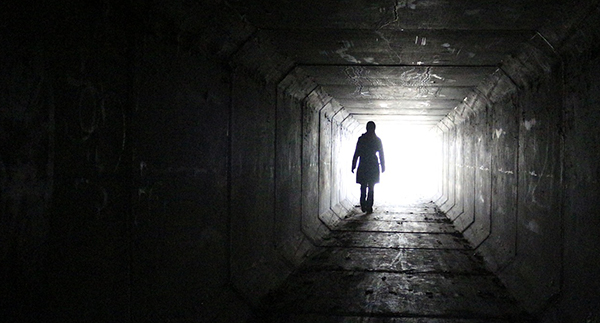“No one ever told me that grief felt so like fear. I am not afraid, but the sensation is like being afraid. The same fluttering in the stomach, the same restlessness, the yawning. I keep on swallowing…” – C.S. Lewis, A Grief Observed
When your loved one dies, you are forced through a doorway and the door to the life you once knew slams behind you. Although you yearn and search for re-entry, you cannot go back. Your life has changed, forever and unequivocally.
Your changed life is disorienting, gray and unfamiliar. Nothing is defined and nothing feels normal. The normal comforting things that you once took for granted have disappeared. Even the simple comfort of knowing that your loved one is in the next room is gone. The gentle familiarity of routine and “knowing what to do” has suddenly disappeared and now you find yourself with a persistent feeling of absence, lost in a surreal boneyard of memories with no clear pathway out. It feels like a dark tunnel and you cannot see a new doorway ahead.

You feel alone, but there is hope. You must believe that, and here is why. Grief is a solitary condition but not an abnormal one. Likewise, the tunnel that you’ve entered that leads to a different life is solitary but normal. Your mind and spirit are naturally designed to heal, just like your body. But also like your body, healing of the mind and spirit takes time.
From Change to Transition to Transformation
The sudden loss of a cherished loved one is an excruciating change. But buried within that change is the potential for a transition that leads to a positive transformation.
“Change” is different from “transition.” “Change” is an outward, physical event like the death of a loved one. This change thrusts us into transition. Transition is a process that has a beginning, a middle and an end. Transitions involve letting go of the old, learning to tolerate living in the “neutral zone” while we discover what comes next, and then embracing the change in life, the change in your self — and your new life and self.
Transition is the period when your old way of life is no more but a new way has not yet been discovered. You can feel like you are languishing in a sort of no-man’s-land. Although you may want to numb yourself or escape the pain it in some way, it’s important to stay with your experience and find a healthy way through.
It’s almost a given that you may shout, “I’m not ready! I wasn’t taught how to accept change and flow with a changed life. I didn’t sign on for this! It wasn’t the plan.” We all fight and try to ignore change… and yet it happens. It’s outside of our control.
You may find that you’ve lost your sense of purpose and question: “Who am I now that my beloved has died? What do I do with my new life?”
Our beliefs about life, religion, God and our life’s purpose get challenged in the harsh light of loss. In transition, they are re-evaluated. Having an openness to the process of transition moves you through the dark tunnel with less resistance and introduces you to new perspectives of your life and you.
Grief and transition shatter the stories we tell ourselves about our own lack of vulnerability. Getting in touch with deep vulnerability lays bare our humanness and need for compassion. Self-compassion may begin to grow when we are in the tunnel of transition and is the necessary base for compassion toward others.
Transition can eventually turn into Transformation.
Although it may feel endless and impossible, we eventually find that new doorway.
You probably can’t even imagine it now… but it’s ahead. Keep walking. Keep hoping. Keep allowing others to help you through. Remember, you are not alone. Many people have traveled through this tunnel before you.
In the future, you may look back and see that you have become a kinder, more compassionate, more appreciative, gentler person. Because you went through the transition called Grief.

